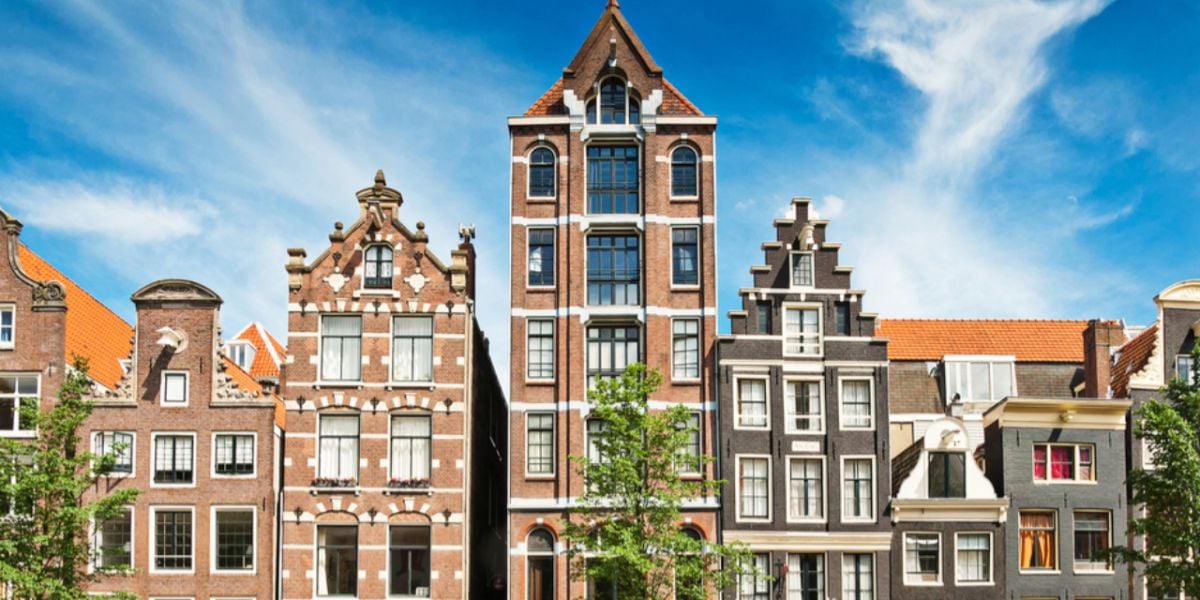
Sorting out the proper visas to move to the Netherlands is just the first hurdle in your big move to Amsterdam. The next one is finding housing. In other countries, you may be able to move and find a suitable apartment in less than a week. But because Amsterdam is such an attractive place to live in, plus there's limited housing available across the entire nation, you should be prepared for an arduous search. Also, it most likely won't yield very cheap rentals, so make sure to come with a decent amount of savings.
Where to find housing in Amsterdam?
Pararius is the leading website for people searching for housing in Amsterdam. It's free to use, plus the listings are updated daily, so you can rest assured that the results you find are up-to-date. You can also register and subscribe to individual real estate agencies, such as RE/MAX.
Another good resource to use is Facebook groups, especially if you're just looking for a room in an apartment or house in Amsterdam. Because housing is so hard to find, many people will band together to search together, so this can be very beneficial to you. Do note that landlords must apply for extra permits to house more than two people, so it'll be rare to find legal housing where you and your friends can reside.
Which are the popular neighborhoods in Amsterdam?
Here are some neighborhoods you should look at when you want to move to Amsterdam.
De Pijp
De Pijp is one of the most popular neighborhoods in Amsterdam for expats. It's part of Amsterdam Zuid (Sout,h) and you'll find lots of young and free-spirited people living here. While some families live here, there are better choices, especially if you prefer quieter spaces. Mainly students and bohemian types reside here.
You'll have a great social life here, as there's always something to do, even at night. Most of the hangout places in De Pijp are unique and vibrant, which can get your creative juices flowing if you're artsy.
You can get to the center of Amsterdam by biking for 10 minutes or taking the bus or metro. Both come frequently, and it'll only take minutes to get to wherever you wish.
Museumkwartier
As the name suggests, the Museumkwartier will put you right in the midst of Amsterdam's greatest museums. It won't be cheap, though, so you need a decent income to live in this neighborhood. But the plus side is, you'll find lots of large homes.
In addition to museums, the Museumkwartier also has good access to parks and gardens, such as the Vondelpark, the most famous park in the country. You'll also be close to beautiful canals that people from all over the world come to see.
De Wallen
This is definitely not a family-friendly area. Not only is it where the Red Light District is located, but it's also where all the tourists gather. This means the streets here will be lively well into the early morning hours. De Wallen also has beautiful sights to offer, with charming streets and pretty canals.
However, this can be exciting and attractive to young professionals. After all, how many people can say they've lived in the Red Light District?
Do note that because it's part of the city center, rent prices will still be expensive. However, you'll be centrally located, so you won't be far from the best attractions in Amsterdam.
Noord
"Noord" means "north", and this area is located north of the IJ River; you can take a free ferry from Amsterdam Central Station to Amsterdam Noord, or you can drive or take the bus or metro over here.
Admittedly, Amsterdam Noord can feel isolated from Amsterdam proper, which can be a plus for some people. And while it didn't have the best reputation in the past, that's changed in the last few years. The housing crisis has caused people to look outside of central Amsterdam, and Noord was the perfect place to upgrade.
Here, you'll find more spacious properties and more affordable rent prices. Amsterdam Noord is a melting pot, so you'll find expats and Dutchies from all walks of life. And because it's across the IJ, you won't have to deal with throngs of annoying tourists.
Amsterdam Noord has lots of family-friendly activities, such as festivals and hip hangouts.
Nieuw-West
Are you moving with your family and need a large house at an affordable price? Then try Amsterdam Nieuw-West. It's a peaceful neighborhood with lots of other families, so your kids will make friends quickly. In fact, there are plenty of outdoor spaces for them to play safely.
Nieuw-West is also good if you plan on driving. While it's tough to find parking in most parts of Amsterdam, the newer properties in this neighborhood often have parking included, so you won't have to struggle with parking your car every day.
Jordaan
If you want to live somewhere hip and bohemian, but want to be closer to the city center, then Jordaan is a good choice. Many young expats are attracted to this neighborhood as there are lots of unique and quirky places to go.
Young professionals find Jordaan excellent to reside in because there are many coworking spaces available. Not to mention, there are also one-of-a-kind cafes to bring your laptop to, if you prefer that instead.
The downside to living in such a cool and convenient neighborhood is that the rent prices are high. If you manage to find housing, it won't be very big either.
Westerpark
Perhaps you prefer to live somewhere a bit quieter. This may seem impossible to find in Amsterdam, but there's a little slice of peacefulness in Westerpark. This neighborhood is still considered part of the city center; it's located in the northwestern part. However, it comes with much more affordable rental prices, so it's ideal for young expats who don't have a huge budget. Not surprisingly, Westerpark's attracted lots of expats and even families.
Another plus of living in Westerpark is that it's car-free. If you feel nervous about biking in a new city, then this is the perfect neighborhood to get your bearings.
You can also expect Westerpark to have lots to do. There are many events and festivals, as well as an arthouse cinema you can frequent.
De Biljmer
De Biljmer (also known as just Biljmer or Biljmermeer) is part of the Zuidoost (southwest) area of Amsterdam. It's not particularly interesting here, but it's definitely suitable for families who want affordable housing. You can always reach the center of Amsterdam by biking (it takes 20 to 30 minutes) or taking public transportation.
Because it's quieter, this neighborhood puts you away from the large crowd of tourists. It's safe and very residential, so you'll enjoy peace out here.
Rent prices in Amsterdam
In general, rental prices are pretty uniform across Amsterdam and even across the major cities in the Netherlands (the Randstad). Again, the housing market in Amsterdam is not only crazy because of local demand but also because many British citizens moved over before Brexit went through.
If you're a single person who wants to rent out a furnished one-bedroom apartment, a reasonable amount to expect is €1,500 to €2,000 a month. Or you can rent out a room in a shared apartment for around €700 to €1,000 a month. For a furnished two-bedroom apartment, expect to pay around €2,500 a month.
While there are rental contracts that include utilities, many do not. If the place you're looking at doesn't, then expect to pay around €100 more per month. You should leave a huge portion of your budget for gas; the war in Ukraine drove up gas prices by over 100% in late 2022, but prices have gone down since then. However, prices are still higher than prior to 2022, and electricity prices have gone up too.
Another thing you need to take into account is your budget for a hotel room. Depending on the time you arrive in the Netherlands, you may need hotel accommodations for several weeks, maybe even for longer than a month. Even the cheapest hotels can be around €100 per night (depending on the time of the year and where you're staying), so make sure to be prepared for costs incurred from an extended stay at a hotel.
Rental requirements for expats in Amsterdam
Not only do you need to be able to afford your monthly rent, but you also need to show you have income that's considerably above that amount. Most landlords require that their tenants have income that is three to five times the rental amount, so even if you find an apartment for €1,000 a month, you may have to prove you have a monthly salary of at least €3,000.
If this isn't possible, you'll want to show proof of money in your savings account. Of course, the higher the amount, the more security it'll be, so think about building up a substantial balance in your savings account before moving. But if you've secured a work contract that pays handsomely, then you won't have to worry about that as much.
Obtaining a BSN number as an expat in Amsterdam
When you look at apartment listings, you might see a section that says if registration is possible or not. To get a BSN number (the Dutch equivalent of a Social Security Number), you'll need to reside at an address where you can register.
Registration isn't possible for many of the cheaper properties available for rent. This is usually because the landlord is illegally claiming to live in the apartment so they can avoid taxes. Although the prices may be attractive, avoid “no registration” properties, as it can make things a lot harder for you both now and in the future.
Choosing accommodation as an expat in Amsterdam
Amsterdam landlords are notorious for unreasonably keeping tenants' deposits. This is because they know most expats either move to another country or go back to their original ones; either way, it's difficult for them to file disputes.
If you take pictures of everything the moment you move in, then you'll have evidence on your side should the landlord try and blame the damage on you.
Do you still need help getting your deposit back? Or do you have other legal difficulties with your landlord? Then, be sure to visit the Juridisch Loket. This organization offers free legal help so that you don't get swindled by landlords who prey on unsuspecting tenants.
How to buy property as an expat in Amsterdam
The rental prices may have you gasping, so you might be considering purchasing property instead. The bad news is, that the real estate market here is also very hot, with barely any affordable properties up for sale. On average, in 2024, a house will cost you €707,420, which is an increase of 2.3% since 2023. The market is only set to become hotter, as Amsterdam is an attractive city for not just Europeans but internationals, too. So properties will become more expensive and scarcer as well. Huge overbidding is normal, so keep this in mind when you're browsing listings.
If you still feel like buying property in Amsterdam is the right step forward, then the good news here is you won't have to be a citizen to do so. All you'll need is a permanent contract for a mortgage, as lenders want to see that you'll reliably pay back your loan. As a freelancer, it'll take more time and paperwork, as lenders will want to see three years of client history in the Netherlands. Three years is the bare minimum; lenders will usually want to see more years for better security and peace of mind. Do note that non-EU citizens will have more hoops to jump through as well.
Just a few years ago, mortgage interest rates were at an all-time low of around 1%. However, they're between 3.8% to 6% now, so it may not be the ideal time to buy. If you're determined to do so, then work with a mortgage advisor since they can find you all the best options.
You should also hire a real estate agent, especially if you don't know Dutch and/or aren't familiar with the real estate landscape here. While both mortgage advisors and real estate agents will cost you extra, that money spent will take a lot of stress and anxiety off your shoulders, as they'll be able to hold your hand through the process.
We do our best to provide accurate and up to date information. However, if you have noticed any inaccuracies in this article, please let us know in the comments section below.








